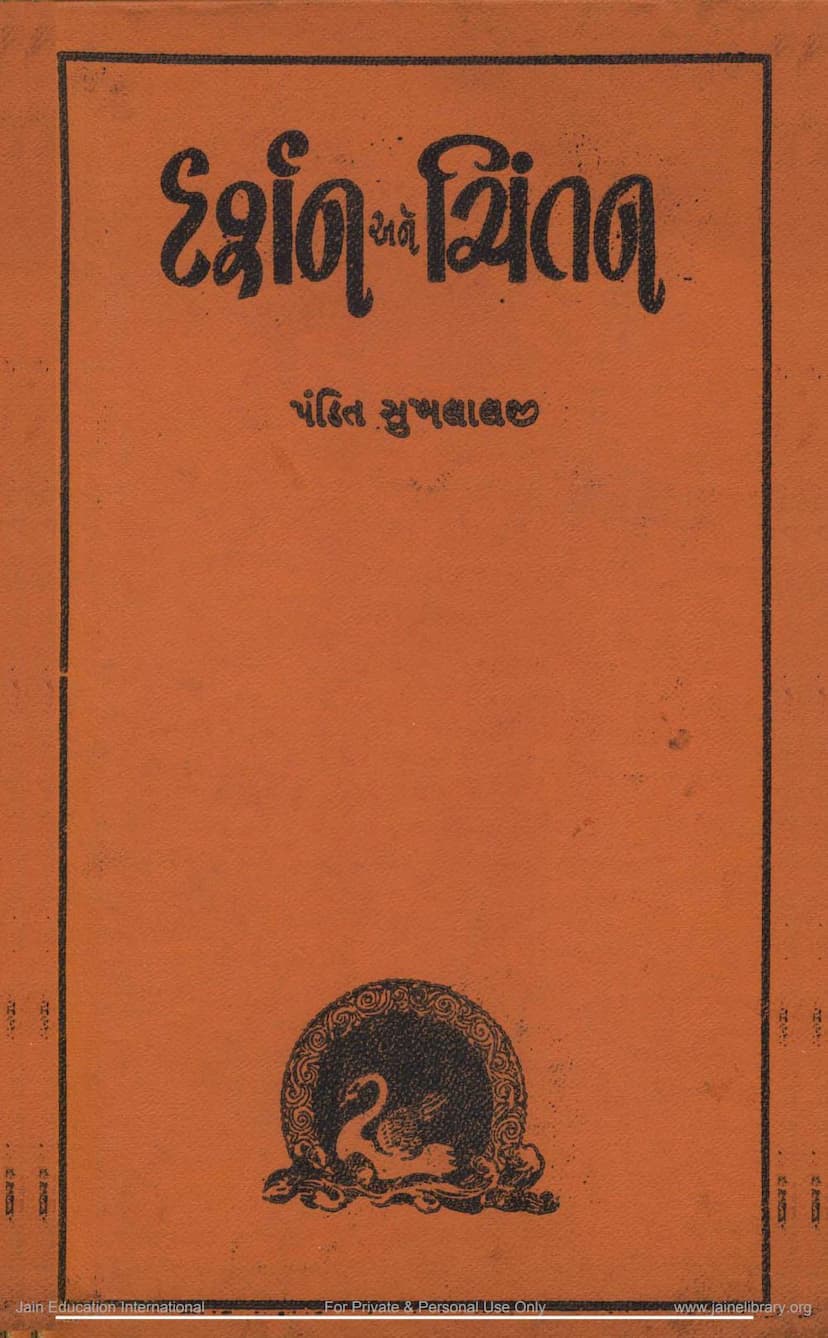Darshan Ane Chintan Part 1
Added to library: September 1, 2025

Summary
Here is a comprehensive summary of the Jain text "Darshan ane Chintan Part 1" by Sukhlal Sanghavi, based on the provided pages:
Book Title: Darshan ane Chintan Part 1 Author: Pandit Sukhlal Sanghavi Publisher: Sukhlalji Sanman Samiti, Ahmedabad
Overall Purpose: This book is a collection of Gujarati essays and speeches by Pandit Sukhlal Sanghavi, published by the Pandit Sukhlalji Sanman Samiti in Ahmedabad. It aims to honor Pandit Sukhlalji and present his profound thoughts on Jain philosophy, religion, society, and broader intellectual topics. The publication was part of a larger national-level honorific initiative recognizing his contributions to Indian scholarship.
Key Themes and Content:
The book is structured into various sections, showcasing the breadth of Pandit Sukhlalji's writings and intellect. The primary focus, as indicated by the title "Darshan ane Chintan" (Philosophy and Contemplation), is on deep philosophical and thoughtful analysis.
1. Pandit Sukhlal Sanghavi's Life and Philosophy (Brief Introduction): The book begins with a brief introduction to Pandit Sukhlal Sanghavi, highlighting his birth in Surendranagar district, Gujarat, and his profound dedication to knowledge and truth. It touches upon his adventurous spirit in childhood, his early exposure to scholarly pursuits, and his eventual dedication to Jain philosophy and scholarship. His intellectual journey is characterized by a synthesis of different philosophical viewpoints, influenced by his study of various traditions and his interaction with thinkers like Mahatma Gandhi.
2. The Nature of Knowledge and Philosophy: Pandit Sukhlalji emphasizes the importance of knowledge (jnana) and wisdom (prajna). He highlights the distinction between theoretical knowledge and its practical application in life, emphasizing that true wisdom lies in the integration of both. He discusses the role of intellect (buddhi) and effort (purusharth) in spiritual and intellectual pursuit, stressing that genuine progress comes from sustained and dedicated effort.
3. Core Jain Principles: The book delves into fundamental Jain principles such as:
- Ahimsa (Non-violence): Explored not just as an absence of violence but as an active principle of compassion and harmlessness towards all living beings.
- Aparigraha (Non-possession/Non-attachment): Discussed in the context of detaching oneself from material possessions and worldly desires as a path to spiritual liberation.
- Anekantavada (Multi-perspectivism/Non-absolutism): Presented as a crucial philosophical tool for understanding truth from multiple viewpoints, fostering tolerance and avoiding dogmatism. This is highlighted as a key contribution to resolving philosophical differences.
4. Social and Religious Commentary: Panditji offers insightful commentary on social and religious issues, emphasizing:
- Harmonious Society: The need for a religious society that integrates pure intellect with sincere faith.
- Balance of Action and Renunciation: True religion is found in the synthesis of both activity (pravrutti) and renunciation (nivritti), rather than an overemphasis on one.
- Inner Purity: The importance of inner purification as the basis for the utility of any external rituals or conduct.
5. Philosophical Discourse: A significant portion of the book is dedicated to philosophical discussions, particularly on:
- Pramana and Prameya: Examining the concepts of valid knowledge and the objects of knowledge in Indian philosophy.
- Comparative Philosophy: His ability to compare and analyze different philosophical systems with an unbiased perspective is noted as a strength, influenced by his understanding of Anekantavada and his association with Mahatma Gandhi's interpretation of Anekantavada in daily life.
- The Role of History and Comparison: Panditji's writing style is characterized by its historical perspective (aitihasik drishti) and comparative approach (tulnatmak drishti), which he uses to present facts and guide the reader towards conclusions, sometimes leaving the final judgment to the reader.
6. Focus on Jainism and Indian Philosophy: While Pandit Sukhlalji's expertise spans various schools of Indian philosophy, his writings often center on Jainism. He clarifies the essence of Jain Dharma and its philosophy, comparing it with other Indian philosophical systems. He argues against rigid sectarianism and emphasizes the capacity of the Gujarati language to express profound philosophical ideas.
7. Literary and Scholarly Contributions: The book acknowledges that Panditji's literary output extends beyond these collected essays. His extensive research, editorial work on ancient Jain and Prakrit texts, Sanskrit writings, and correspondence are mentioned as further testaments to his vast literary contributions, much of which remains to be published.
8. Personal Reflections and Experiences: Interspersed within the philosophical discussions are glimpses of his personal reflections, travelogues, and memoirs, offering a more intimate understanding of the scholar.
9. The Organizing Committee and Publication: The editorial board, consisting of prominent scholars like Shri Dalsukhbhai Malvania (Chief Editor), Shri P. Becharlal Jivaraj Deshi, Shri Rasiklal Chotalal Parikh, Shri Chunilal Vardhaman Shah, Shri Balabhai Virchand Desai, and 'Jayabhikshu', worked diligently to compile these writings. The publication was supported by the Jain Sanskriti Sadhan Mandal, Varanasi.
Overall Significance: "Darshan ane Chintan Part 1" is a valuable resource for understanding Pandit Sukhlal Sanghavi's intellectual legacy. It reflects his commitment to disseminating knowledge, his deep philosophical insights, and his dedication to promoting Jain thought within the broader context of Indian philosophy and culture. His emphasis on reasoned faith, intellectual honesty, and the practical application of philosophy in life resonates throughout the collection.